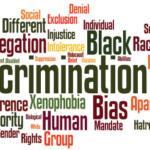2020 has not only borne witness to a global pandemic, but also to increasing fervor in the fight for racial equity. In a wave of opposition to the systemic racism in the U.S., people have been in the streets demonstrating and protesting against social injustice and have taken to social media to promote political action. Like the civil rights movement of the 1960s and the riots in L.A. after the death of Rodney King, the protests that ensued after George Floyd was killed by police have increased the urgency of attaining racial equity in this country.
Like many organizations, the ACR issued a statement after Mr. Floyd was killed to condemn “all acts that cause marginalization, discrimination, harm or death to any person.” This statement touched on documented health disparities, such as in lupus mortality and arthritis disability among minorities with rheumatic disease. These disparities are symptoms of systemic racism in the U.S. and in the field of medicine.
That systemic racism exists in medicine is not to say a large percentage of healthcare providers are racist. In fact, systemic racism doesn’t rely on the presence of people who are racist. Rather, this brand of racism is often unintentional and results from established—and unquestioned—policies, procedures and workflows.

Irene Blanco, MD, MS
“We need to move away from the definition of racism as an individual interaction between two people. It’s not, necessarily,” says Irene Blanco, MD, MS, professor of medicine, associate dean of diversity enhancement, and rheumatology fellowship program director at Albert Einstein College of Medicine, The Bronx, N.Y. “We need to think of racism much more as a system of oppression that is much wider and grandiose than any one individual person.”
The consequence of systemic racism in medicine is health disparities among minority patients (e.g., in lupus and arthritis). These disparities are compounded by systemic racism in other facets of society, such as in access to healthcare and health insurance, housing and segregation, socioeconomic status, and the criminal justice system.

Ashira Blazer, MD, MSCI
“It is important to remember that because medicine is an institution in America where multiple layers of systemic racism exist, it’s difficult not to have systemic racism in medicine,” says Ashira Blazer, MD, MSCI, assistant professor of medicine in the Division of Rheumatology at NYU Langone Health. “Whenever certain groups of people are disenfranchised, … those same groups end up being either inadvertently or outright discriminated against by the ways that we practice medicine.”
Addressing systemic racism in medicine is complex, but the first step is recognizing that it exists and being willing to talk about it. When the conversation is approached openly, honestly and with good intentions, real change is possible.



